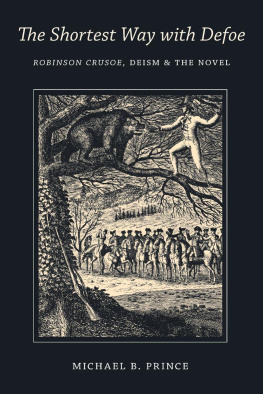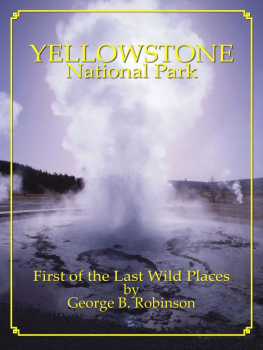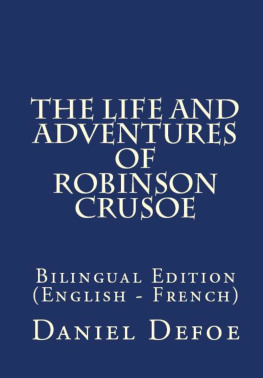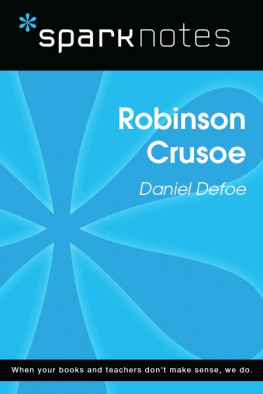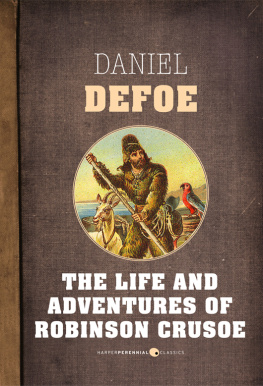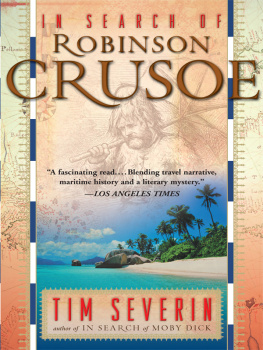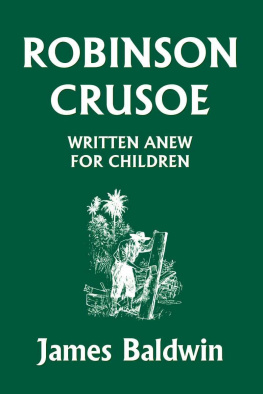This edition is published by ESCHENBURG PRESS www.pp-publishing.com
To join our mailing list for new titles or for issues with our books eschenburgpress@gmail.com
Or on Facebook
Text originally published in 1945 under the same title.
Eschenburg Press 2017, all rights reserved. No part of this publication may be reproduced, stored in a retrieval system or transmitted by any means, electrical, mechanical or otherwise without the written permission of the copyright holder.
Publishers Note
Although in most cases we have retained the Authors original spelling and grammar to authentically reproduce the work of the Author and the original intent of such material, some additional notes and clarifications have been added for the modern readers benefit.
We have also made every effort to include all maps and illustrations of the original edition the limitations of formatting do not allow of including larger maps, we will upload as many of these maps as possible.
ROBINSON CRUSOE, USN:
THE ADVENTURES OF GEORGE R. TWEED, RM1C ON JAPANESE-HELD GUAM
As Told To
BLAKE CLARK
FOREWORD
DANIEL DEFOE would have admired George Ray Tweed, the American seaman whose ingenuity and self-reliance have caught the imagination of modern America as Robinson Crusoes fascinated eighteenth century England. Defoes hero was engaged almost solely in a struggle for survival against nature. Tweeds similar fight was complicated by the necessity of evading a band of killers relentlessly tracking him from hideout to hideout.
Crusoe and Tweed were most alike in the genius for contrivance, and Tweed doesnt suffer from comparison with his famous prototype. To construct his shelter and furniture, Crusoe brought from his ship planks and boards and a complete carpenters chest of tools, in addition to two saws, an ax, an abundance of hatchets, a hammer, nails and several knives. Tweed built his equipment without benefit of nails, using only a handsaw, a machete, and a pocketknife. He went on to fashion, with crude materials, a lamp, a lantern, and an ingenious alarm system. At one time he had electric lights in a part of the country where not even the best homes enjoyed such luxury. He kept in repair an almost worn-out typewriter, on which he produced a one-page underground newspaper. He tore apart an apparently useless radio, put it together again, and brought in news from a station thousands of miles away.
Tweed was born with common sense. A roustabout life as lumberman, stevedore, and mechanic gave him self-reliance; hunting expeditions in Oregon and California taught him woodsmanship; the Navy instructed him in the techniques of communication. It was as if all his early life had been preparation for the grueling experience which he alone, of those who fled before the invading Japanese, survived.
I am glad to be the one to tell Tweeds story. In all important respects it is related here exactly as he gave it to me.
Blake Clark
Washington, D.C.
December 21, 1944
PART ONETHE CHASE
1
Damn Leathernecks! I swore, as rifle and machinegun fire penetrated my sleep. You would come out here practicing and wake people up in the middle of the night! It was three in the morning. I rolled over and went back to sleep.
Then I heard the field guns. First came the blast that sounded like a young cannon when the guns were fired, then the report of the exploding shell. That woke me up and snapped me out of it. We Americans had no field guns on Guam.
Thats not Marines! Thats Jap fire!
I scrambled up, knowing exactly what I wanted to do. At the Navy Communication Office where I worked as radioman we had discussed plans for action long before the first bomb fell on December 8. We knew that unfortified Guam could not hold out long. There were two choices, long argued about in bull sessions. We could take to the bush and hide out in the jungle where there was a good chance of not being discovered, or we could surrender and become prisoners of the Japs.
It was not a hard decision for me to make. I wasnt going to be prodded in the rear with a bayonet by a Jap soldier.
As I pulled on my khaki shirt and trousers, Al Tyson rushed in with a Chamorro named Gevarra, who was in the insular service. Al was one of my best friends on Guam. He had made up his mind to go to the bush with me.
For Gods sake, hurry, Ray! Lets get out of here, he called. The Japs are in!
We cant go without permission from headquarters, I yelled back at him. Im not going to be charged with running out under fire!
You cant cross the street to get an okay now, he said. The Japs have a machine gun set up in front of the church.
Ill have to go anyway. Ive got to bust up those transmitters and generators before the Japs get them.
I was just over there, Al said. The men on watch smashed them. Come on. Lets get the hell out of here!
I still have to get authorization, I said stubbornly.
I just got permission from the Governors palace.
Maybe you did, but that wont help me any.
The commander said it was all right for us to take to the bush.
Well, he didnt tell me that. Ill have to go over there, I said, and ducked out. Practically speaking, Al was right, but after eighteen years of Navy training my mind worked according to regulations.
My house was on the side street. It led into the main avenue, San Ramon. As I ran across, the Jap machine gunner started firing. I was about one hundred yards away from him, and he missed me. Once on the other side, I dove into a hedge, then over a fence, and made my way to the palace of the Governor, Capt. George J. McMillin. Inside I met Commander Giles, his aide. There was no excitement in his voice. He sounded as if he were discussing the attack over breakfast coffee.
We are going to offer only token resistance and surrender, he told me. We havent enough men to fight it out. Do you have a gun?
No, sir, I havent, I answered, hoping he might hand me one.
Well, you can make your own decision. You can stay with us and surrender, or fend for yourself in the bush.
Thank you, sir. Thats all I wanted to know. Ill take the bush.
He shook hands with me and wished me luck. As I hurried out, I met Chief Yeoman Blaha, Yeoman Eads, and Chief Machinists Mate Smoot. It flashed into my mind that Smoot two days ago had told me that hed had a premonition he was going to be killed. He had worried himself sick about it.
Howre you doing, Smoot? I asked.
Okay, he answered. Were going to the bush.
See you there, I called over my shoulder and ran out the back way.
I dodged across the street again before the machine gunner could get a line on me, and found Al and Gevarra at home still waiting. The Jap field gun, which had ceased firing for a while, started up again, much closer. Poor Gevarra was frightened almost out of his senses. He picked up the cardboard back of a writing tablet lying on the table, crouched down in a corner and put the square of paper over his face for a shield. There was no use trying to buck him up. We had to work fast.
I rushed into the bedroom and yanked a pillow off the bed. Into the case I shoved two suits of underwear, a Navy issue blanket, and a flashlight. I threw the gear into an apple box filled with canned goods, the last order from the Navy Commissary. Just as I hoisted the provisions to leave, Al stopped me.





